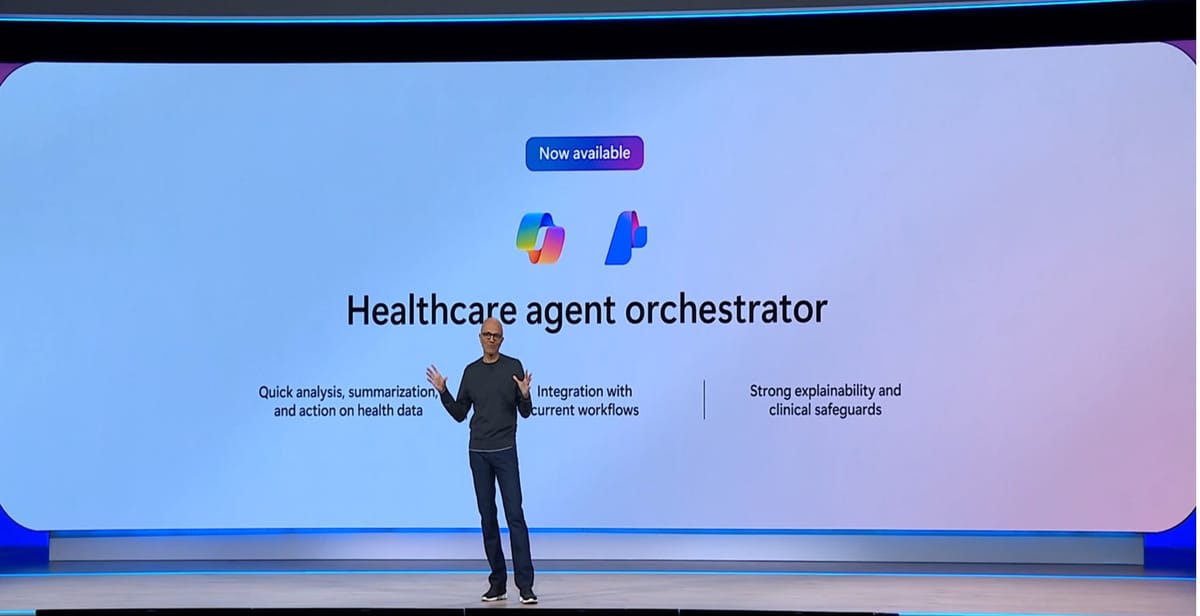Microsoft has launched its Healthcare Agent Orchestrator, a new AI system designed to tackle one of medicine's most labor-intensive processes: cancer care planning. The company announced today that Stanford Medicine is already implementing the technology to connect medical data, clinical trials, and other critical information with the goal of delivering more effective cancer care while reducing the administrative burden on healthcare providers.
Key Points
- Healthcare Agent Orchestrator coordinates multiple AI agents to analyze diverse medical data like imaging, pathology, genomics, and clinical records
- Stanford Medicine is already using it to speed up tumor board prep for cancer care.
- The system runs inside Microsoft 365 tools like Teams and Word.
The Healthcare Agent Orchestrator coordinates multiple specialized AI agents that can each handle different aspects of cancer care planning — from analyzing radiology images and pathology slides to reviewing clinical trial eligibility and creating comprehensive reports.
"Stanford Medicine sees 4,000 tumor board patients a year, and our clinicians are already using foundation model generated summaries in tumor board meetings today," said Dr. Mike Pfeffer, Chief Information Officer at Stanford Health Care and Stanford School of Medicine. Stanford is particularly interested in streamlining workflows by "reducing fragmentation" and "surfacing new insights from data elements that were challenging to search, such as trial eligibility criteria, treatment guidelines, and real-world evidence."
The technology addresses a sobering reality in cancer care: while multidisciplinary tumor boards — where specialists from various fields collaborate on treatment plans — have "demonstrably improved patient outcomes," less than 1% of cancer patients currently have access to these personalized treatment plans. This limited access is largely due to the intensive preparation required, with clinicians spending between 1.5 to 2.5 hours reviewing each patient's data, according to a study by the American Society of Clinical Oncology.
Microsoft's approach appears strategically designed to meet healthcare systems where they already operate. The orchestrator can be integrated directly into familiar tools like Microsoft Teams, Word, PowerPoint, and Microsoft 365 Copilot — software that "the majority of healthcare organizations already use." This integration allows specialists to interact with AI agents within their existing workflows rather than adopting entirely new systems.
Other institutions testing the system include Johns Hopkins, UW Health, Mass General Brigham, and Providence Genomics. According to Microsoft, these partners are helping refine how agentic AI can be used in live clinical environments, especially where there’s a need to process messy, multimodal data quickly.
One standout example: at UW Health, radiologist Dr. Joshua Warner is using the tool to explore ways tumor board reviews—normally 2+ hours per patient—could be reduced to just minutes. Providence, meanwhile, is leaning into genomics matching and evidence parsing, where the orchestrator’s ability to handle structured and unstructured data together makes a real difference.
What makes this system particularly notable is its open-ended design. Microsoft says "any approved agent—including third-party—that exposes an API, tool wrapper, or MCP endpoint can be pulled into a Teams conversational thread." This has already led to collaboration with companies like Paige.ai, which is shipping their "Alba" pathology agent that can analyze whole-slide images to deliver "real-time conversational digital pathology insights."
The Healthcare Agent Orchestrator is available now through the Azure AI Foundry Agent Catalog, though its initial implementation appears focused on research and development rather than immediate clinical deployment. While Microsoft's announcement highlights the technology's potential to transform cancer care planning from "hours" into "minutes," the company is careful to frame the current implementation as a system for studying how AI agents might assist tumor boards, with broader applications to be explored in the future.
For healthcare developers and clinicians interested in exploring the technology, Microsoft notes that the Healthcare Agent Orchestrator can be accessed through the Azure AI Foundry Agent Catalog, where they can begin building customized agents for their specific clinical needs.

